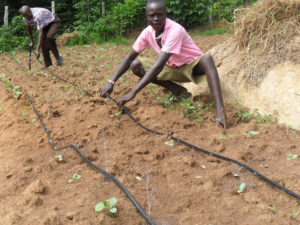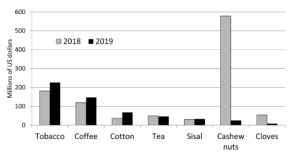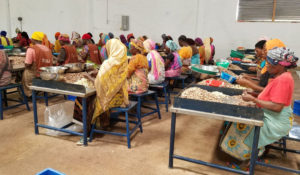by David Brewin
Climate-Smart Agricultural Solutions
The Netherlands Development Organisation is providing $43.68 million for a fund aimed at increasing food production using Climate-Smart Agricultural Solutions in Tanzania, Kenya, and Uganda.
Project Manager Joseph Muhangwa has explained that the beneficiaries will be smallholder farmers, farm input providers, small and medium business enterprises, agricultural service providers and cooperatives which deal in the value chain of pulses, oilseeds, potatoes, and cereals in the three countries. The money will mostly go directly to various businesses that meet the relevant criteria during the next five years. The support is designed for businesses that are too risky for financial institutions to support, but which meet the project’s expectations. The project manager has been quoted as saying that businesses benefiting from the project must demonstrate involvement of smallholder farmers and be climate-smart or environmentally-sustainable. They should also be all inclusive in terms of women and youth. Most importantly the ideas should be replicable.
The maximum amount available for any given business is $224,000 or 50% of the total business case cost. In Tanzania the beneficiaries will be agricultural entrepreneurs in Mbeya, Katavi, Njombe, Ruvuma, Arusha, Kilimanjaro, Dodoma, Singida, Tabora and Manyara regions.
The programme’s aim is to increase production and income for 300,000 farmers and improve business performance for 50 small and medium entrepreneurs and 30 cooperatives. The program analyses the climate risk of food value chains and business opportunities in the three countries.
Livestock and leather
Tanzania’s huge livestock population provides the economy with not only meat, milk and associated products, but also raw hides and skins which are processed into leather.
In the East African region, Tanzania has the second largest herd of livestock (after Ethiopia) and produces 3.9 million bovine hides, 2.5 million goat skins and 2.3 million sheep skins each year. But thousands of tonnes of skins and hides apparently go to waste.
Two Italian companies have signed an agreement with the prisons department and the Public Service Social Security Fund to establish two leather factories in Moshi in the Kilimanjaro region. The companies will invest $24.5 million to construct the two leather factories, managed jointly with Karanga Leather Industries Company in Karanga prison. The factories, one for shoe-making and another for tanneries, will be constructed on 25 acres of land at the industrial area within Karanga Prison and are set to be completed in 16 months. The Italian companies will provide both finance and technology for production of quality leather products for export to Italy and other European countries. The plant is expected to produce 1.2 million pairs of shoes per year.
President Magufuli has also invited Egyptian investors to invest in livestock-based industries modelled on Egyptian technology.
The cashew nut marketing saga
Details were given in the last issue of Tanzania Affairs concerning the intervention by President Magufuli in the marketing of Tanzania’s valuable cashew nut crop to help growers. The search for processes came at a time when the Tanzania government was still holding a huge stock of cashew nuts, estimated at 200,000 tonnes, which it bought from farmers in November last year after it failed to secure foreign buyers. It seems that the Kenyan company, Indo Power Solutions, which agreed to buy 100,000 tonnes of cashews from Tanzania, took the Tanzania government for a ride in the $180 million deal after it surfaced that the company was not known to have transacted any deals worth more than $10m and was a trader of various commodities but not cashews.
Cashew nut sales on the international market dropped 63% to $196.5 million last year, compared to $529.6 million in the 2017 trading period. Recent figures show that exports fell from 329,000 tonnes in 2017 to 120,000 tonnes in 2018.
Cashew nut production during the 2017/2018 season stood at about 240,000 tonnes; out of which, some 213,000 tonnes were produced by the government. Some 90% of the cashew nuts are exported in their raw form owing to the country’s low processing capacity.
To increase local returns, Tanzania is looking for investors to add value on the nuts and process them into products such as cashew nut cheese or butter, sweets, fruit drinks or distilled liquor lubricants.
The government has set aside 540,000 ha of land for agricultural expansion and industrial development.
Banana research
More than 20 varieties of bananas are grown in Tanzania, although not all are suitable for human consumption. They are popular due to their non-seasonal nature and, apart from playing a key role in ensuring food availability all year round; the crop provides an annual income for households of about $1,500.
Furthermore, the banana plant trunk can be cut up for use as livestock feed, and its fibres can be used for fencing, making paper and crafting various works of art.
Late last year the Tanzania Agricultural Research Institute confirmed 16 new drought and disease resistant banana hybrid varieties in the banana producing regions of Mbeya, Kilimanjaro and Kagera.
Tanzania is also making plans for a new banana research centre. Belgium has pledged $1.29 million for a Centre of Excellence to be based at the Nelson Mandela African Institute of Science and Technology in Arusha.
Boosting rice output
Tanzania’s main food crops are maize, rice, sorghum, millet, legumes, nuts and other tubers, horticultural crops and coconuts, all produced largely by smallholder farmers.
Maize and rice are the most important staple food crops grown in most parts of the country. About two million farmers grow rice.
The Permanent Secretary in the Ministry of Agriculture, Matthew Mtingumwe, has announced a new 12-year plan to raise annual rice production from 2.2 million tonnes to 4.5 million tonnes. The strategy will be implemented between the government and with funding from the World Bank, Japan International Cooperation Agency and the African Development Bank.
Over the years crop production has been dropping partly due to low adoption of recommended agricultural production practices and lack of fertilisers. The 12-year plan to boost rice production can be viewed as a means of forestalling a food crisis in the region, with many African countries south of the Sahara counting below average rains and drought which has caused a sharp rise in cereal prices.
15 Coffee species facing extinction
According to botanist Aaron Davis writing in Nature, 15 species of coffee out of the 75 species grown in the East African coffee sector are threatened with extinction. Tanzania has been facing a dry season in many growing areas.
The Tanzania Coffee Board has estimated that about 450,000 families in Tanzania grow coffee. Arabica coffee accounts for more than half of the country’s production. It exports over 12,000 metric tons annually – mainly to Japan and Germany.
Poor agricultural practices among the mainly smallholder producers are causing the decline of Arabica and Robusta so that attention is very slowly being drawn back to wild coffee because of its tolerance of changes in the weather and resistance to pests and diseases. Robusta is becoming more popular because it resists coffee leaf rust in many locations, has higher productivity and lower market prices. It also has a high caffeine content.
The UN Environment Programme has identified improper land use, like slashing and burning, and the excessive use of chemicals as leading causes of habitat and forest loss. In East Africa, commercial house construction has taken over even arable land that was initially used for farming. It is often straight, hard and termite resistance which makes it a favourite for use in minor construction. These, coupled with diseases, are causing growers to opt for wild coffee as it is a more attractive alternative for the sustainability of coffee.
Game hunting blocks
Tanzania is introducing a new auction system for big game hunting blocks. The government says that this is aimed at emphasising transparency and curbing corruption in parts of the tourism industry. The Tanzania Wildlife Management Authority is auctioning off 26 hunting blocks for the first time. Eligible hunting companies will be allocated a maximum of five hunting blocks, each in different categories. Most of the hunting blocks are allocated within the 50 km² Selous game reserve ecosystem, a UNESCO World Heritage site known for its elephants, lions, zebras, black rhinos, giraffes and other species. Revenues from the tourism sector fetched $2.43 billion last year, up from $2.19 billion in 2017. Tourist arrivals totalled 1.49 million last year compared with 1.33 million a year ago. The government has said that it wants to bring in one million visitors a year by 2020.



